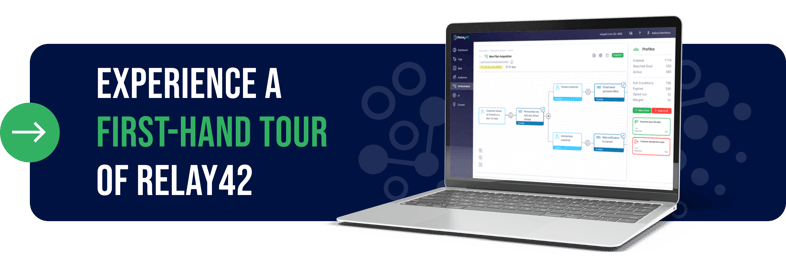How Airline Marketers Are Using AI to Improve the Customer Journey
by Relay42 on 6.11.2018
.jpg)
The rise of AI in the airline industry
The airline industry is keen to invest in AI in order to evolve better and faster. In fact, AI in the aviation market alone is expected to be valued at $2,222.5 million by 2025.
From AI-themed hackathons with 700+ participants to programs that simplify the check-in process by integrating with Amazon’s Alexa, airlines are officially on the AI bandwagon — and it’s paying off. AI is already making it possible for airlines to reduce instances of overbooking, better assist customers with chatbots, and even make boarding faster and more convenient at kiosks with facial recognition.
Airline marketers are no exception to the AI obsession too. They are already starting to use AI to improve the customer journey, well before the customer ever sets foot in the airport. Their goal? To let customers lead their own unique journey.
AI in airline marketing: a new way to guide customers
What does customer-centric marketing look like when AI gets involved? Let us tell you a quick story.
Your return customer, Hailey, visits your airline’s website to look for a flight. Upon her visit, she is recognized as a Silver Status customer. Unfortunately, she doesn’t convert on her first visit, so she’s automatically entered into a retargeting customer journey for loyalty members.
Then, because AI uses her history to understand her, it predicts that Hailey is most likely to interact with visual content, and based on that prediction it shows Hailey a personalized display banner. When she doesn’t click on the banner but visits a metasearch website to compare flights instead, that data is collected and stored in her profile.
AI then uses that data to retarget Hailey with a dynamic travel video, including personalized pricing and the number of loyalty points she can earn by booking her flight with your airline. When she clicks, she lands on a personalized landing page. When she books her flight there, she’s automatically excluded from receiving irrelevant retargeting offers (bye-bye spam) and retargeted to receive relevant ancillary offers for her upcoming flight.
Hailey’s skeleton journey was created by a marketer, but ultimately the path Hailey took was based on her own choices, with AI mirroring those actions with appropriate responses in real time. In other words, it’s the perfect choose-your-own-adventure experience.
AI creates flexible journeys for complex customers
If the example above sounded like a complicated journey, that’s because it was. Customers are complex, and their journeys are rarely linear. So instead of setting up numerous siloed systems to try to target them properly, AI-powered Journey Orchestration allows marketers to set up any number of journey flows and then let the AI make the intelligent real time decisions along the way to mirror the customer’s actual choices.
If you’re curious to read more examples of how Intelligent Journey Orchestration can help airlines tackle other challenges, check out any of the links below to read a short eBook that includes an intelligently orchestrated customer journey on that theme:
- Improving customer acquisition
- Boosting ancillary sales
- Increasing partner cross-sales
- Maximizing load factor
- Raising customer retention
AI in Marketing is so much more than just better CRM distribution
In Hailey’s story above, we explained how AI helped offer her the right content at the right time to help her along her journey. This is a great way to get your feet wet with marketing AI: it’s helpful to marketers, it boosts KPIs and gets results, and most importantly, it improves the customer journey.
But Intelligent Journey Orchestration can do much more than simply improve your CRM distribution. Yes, AI can make decisions about when and where to place content — but it can also determine the perfect messaging.
This is where it gets really interesting, so stay with us.
Destination recommendation with AI
One of the most exciting AI predictions that are helping airline marketers is destination recommendation. Here’s how it works:
Let’s say Hailey is in the orientation phase of her next trip. She wants to escape the short, cold, dark days of winter and enjoy a few days of sunshine, mild temperatures, and a glass of wine (or two) on a beautiful veranda.
Hailey knows what she wants, but she doesn’t know where she wants to go. There are plenty of places that can offer the experience she’s dreaming of, so she’s doing some research on your airline’s website to figure out the best option for her budget. After a bit of browsing, she’s inspired by what she finds and knows which destinations fit in her budget. But she’s not quite ready to make a decision.
At this point, AI knows Hailey is in the orientation phase thanks to her onsite behavior: repeatedly searching and comparing prices for multiple destinations via the on-site search engine. With that data, it can now help you recommend Hailey’s ultimate destination to enjoy some sunshine and good wine:
- First, AI has a look at Hailey’s historical data. It shows she has a tendency to visit destinations in a variety of countries she’s never been before, so the algorithm labels her as a world traveler.
- Then the platform takes Hailey’s recent on-site searches into account, using the new information to further update her unique profile. Based on the destinations she was just looking at, AI detects that she is most likely searching for a sunny destination.
- Finally, the recommendation engine narrows it down even more, to only include destinations that fall within her price range.
Thanks to the power of AI, Hailey is shown inspiring, media-rich content about destinations that will fit her needs, thus feeding her orientation phase with options that are a perfect fit for her travel requirements.
Two critical success factors for applying AI in marketing
There are a couple of things about this process that should really stand out:
- Speed: everything we just described in the stories above happens in the moment, with AI performing complex calculations at groundbreaking speed so that it always has the most current Hailey-specific insights.
- Scale: it’s certainly no mean feat that a platform can personalize one person’s journey in this much detail in real time. What’s much more impressive, however, is that AI can do these calculations for thousands, and even millions of customers for every interaction simultaneously — and without compromising its speed.
AI is already here, and it’s in the details
When we think about AI, we tend to jump to the big stuff, like self-driving cars (or planes) and the singularity. But AI is already making a huge difference in small, yet significant ways — like helping marketers get more out of their time and effort, and helping travelers choose the perfect destination.
In addition to the stories above, AI opens up a whole new world where you can benefit from smart, reliably automated actions around important marketing factors like:
- Personalized pricing: AI can recognize a website visitor as someone who likes to get the lowest fare on her ticket, but who also always upgrades with ancillaries for the most pleasant flight possible. Imagine the journeys you could build that with information!
- Data unification: You can take it a step further by putting your business and product data into the mix. If you know a particular customer is looking for the best deal, you can take that opportunity to push flights with low load factors. This helps you fill your less popular flights while still offering your customer the low price she cares about.
- Date prediction: AI can predict the date on which a traveler is most likely to fly, and then include the timeframe in personalized ads and really draw their attention.
- Likeliness to convert: Predicting the likeliness to convert helps marketers spend their budget more wisely. You can take a data-driven approach to lower bids or even refrain from showing ads to customers who are extremely likely to convert. Or you can opt to display media-rich ads that build brand trust with customers who are less likely to convert.
You May Also Like
These Related Stories

3 Powerful Use Cases to Restart Airline Digital Marketing

How Airlines Can Increase Cross-Sales and Boost Customer Satisfaction


